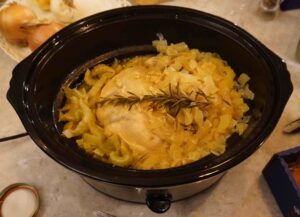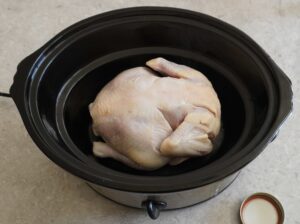Growing up we had a lot of grilled meat, often cooked using the Weber charcoal barbecue my dad got from his father. Dad had a motor for making his own rotisserie chickens, and had his techniques for making a tasty bird – I think he considers himself a connoisseur of this specific dish.
In recent years many grocery stores in the US have started selling pre-cooked rotisserie chickens. The ingredients on a big-box rotisserie chicken indicates they use little ‘chemical cheats’ (carrageenan, etc) to get their chickens to still be acceptable, even after hours have passed since the finished chicken was removed from their big oven. In recent years I’ve bought a few prepared rotisserie Chickens from the grocery store, but dad was always disappointed. The last time he said, “please don’t buy this again.”
While convenient, rotisserie chickens are also a nutritional tragedy, in that some of the most valuable portions of the chicken are wasted. For people working on establishing better health, Edgar Cayce frequently said the juices of meats are much more valuable than the solid portion, but in rotisserie cooking a lot of the juices are lost.
In previous posts (links below) I’ve covered Cayce’s recommendations nourishing the body with chicken. After years of experimenting, I’ve decided ‘dry slow cooker’ is the best way to cook a chicken to maximize the nutritional value.

In a nutshell, I add the chicken and some vegetables to the slow cooker. For the vegetables I’ve been using onions, chopped celery, anise. Any vegetable that has a good amount of water would be useful. If you don’t want to add vegetables right away, you can add a small amount of water to the cold pressure cooker. Cover, then cook for 4 to 6 hours on low (or 2 to 4 hours on high). [Please consult your slow-cooker’s manual for more exact cooking times for a whole chicken.]
Potatoes aren’t very water-dense, so these are better added for the last 2 hours.

On this particular chicken I didn’t add the vegetables right away. After about an hour I noticed the chicken juices had started to hit the bottom of the crockpot and were ‘burning’, so I added .5 to 1 cup of water. On the previous chicken I added the onions at the beginning, which seemed to release more liquid to the bottom of the crock pot sooner in the cooking cycle.
Remove the chicken, then strain the juice. Chill the juice in the refrigerator (it will certainly solidify, due to the gelatin content), then remove the congealed fat. Sip your chicken juice over the next 1 to 2 days.
If you eat the meat, be sure to also consume plenty of skin and cartilage, so you get a balanced amino acid profile. If the chicken has cooked long enough, the cartilage will easily fall off the bones. Cayce often said to ‘eat the bones’, but bones can concentrate lead. Trust your instincts.
Some of my earlier posts about chicken:
Reading 889-1, for an adult woman, covered most of the Cayce principles for healthy eating
[…]
12. Mornings – citrus fruit juices or stewed fruits, fresh fruits or cereals. But do not take the citrus fruit juices AND cereals at the same meal.
13. Noons – preferably all raw green vegetables, though these may be altered between the various kinds or characters. Or there may be had the juices of the vegetables that are cooked preferably not in water, but in their OWN juices – as in Patapar paper, or that are steamed in their own juices. This may include, of course, at times meat juices; but not great quantities of meats. Never any of the white breads. Not too much of the white potatoes, unless an equal quantity of the peeling of same is taken. None of the raw apples, but those that are cooked. These are the things to be warned of. Not too much pastries, but a well balanced diet in the fruits, the vegetables, the meats, is the better for the body.
14. Ready for questions.
15. (Q) Will sea foods be alright for the body, and which one of these should be avoided?
(A) Shell fish should be avoided. Sea foods or fish would be very good; especially deep sea fish.16. (Q) How about eggs?
(A) Only the yolk; not the white of eggs.17. (Q) Will the disturbance in the lungs clear up?
(A) This will clear up, for we will make for the building of resistances that have been low – as indicted in the conditions that arise from the activities of the circulation.Beef juices, liver extracts, tripe, should be the more of the meats for the body. Lamb or fowl or fish are good also, but no fried foods.
18. (Q) How much sweets can the body take?
(A) If these are of honey or saccharin as their base, eat what the body requires. There will be periods when the body’s appetite will desire these, but supply same not from cane sugar but from honey – and especially in the honeycomb.19. (Q) Is coffee or tea harmful to the body?
(A) In moderation these are well. Do not combine milk with either of these when taken.20. (Q) Any other suggestions for the body?
(A) Do these, keeping the mental attitude in a constructive influence; knowing that in the application of these things we only fit the body for a better expression for its purpose in the material world. Not as for the aggrandizement of self alone, but that the body, the mind, the soul, may be as a channel of blessings to others in the name of Him that is the Giver of all good and perfect gifts.21. We are through for the present.
-Cayce Reading (889-1), F ADULT
For other people shellfish were fine to eat. The recommendations were always for specific individuals.